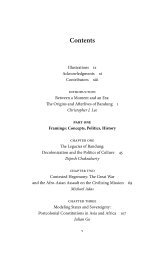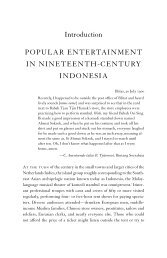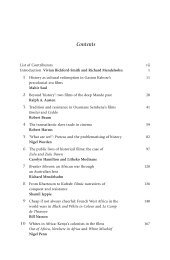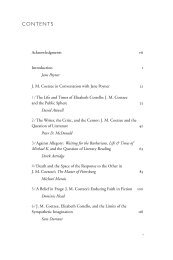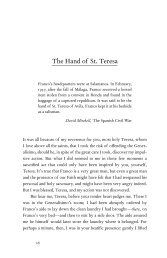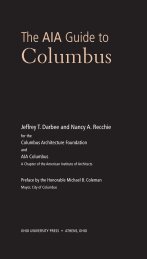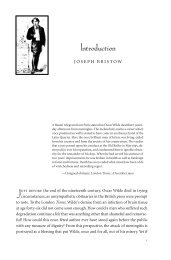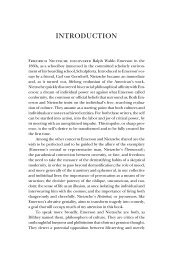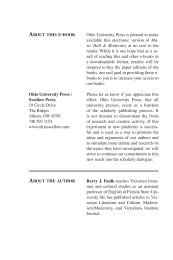Race, Revolution, and the Struggle for Human Rights in Zanzibar ...
Race, Revolution, and the Struggle for Human Rights in Zanzibar ...
Race, Revolution, and the Struggle for Human Rights in Zanzibar ...
Create successful ePaper yourself
Turn your PDF publications into a flip-book with our unique Google optimized e-Paper software.
slavery, <strong>and</strong> exploitation? Would an <strong>in</strong>dependent <strong>Zanzibar</strong> see fur<strong>the</strong>r<br />
<strong>in</strong>equality <strong>and</strong> an <strong>in</strong>evitable clash of communities, or could isl<strong>and</strong>ers<br />
work toge<strong>the</strong>r toward an end, like development, considered by all to<br />
be good?<br />
Founded <strong>in</strong> 1955, <strong>the</strong> <strong>Zanzibar</strong> Nationalist Party (ZNP) attracted <strong>the</strong><br />
support of nearly all members of m<strong>in</strong>ority communities <strong>in</strong> <strong>the</strong> isl<strong>and</strong>s,<br />
as well as a substantial number of Shirazi, who identify <strong>the</strong>mselves as<br />
<strong>Zanzibar</strong>’s <strong>in</strong>digenous population. Shirazi identity, however, was <strong>and</strong> rema<strong>in</strong>s<br />
highly controversial s<strong>in</strong>ce its widespread usage began only <strong>in</strong> <strong>the</strong><br />
1930s <strong>and</strong> because <strong>the</strong> percentage of isl<strong>and</strong>ers who identified <strong>the</strong>mselves<br />
as Shirazi by <strong>the</strong> 1960s dwarfed <strong>the</strong> actual <strong>in</strong>digenous population. Many<br />
Africans claimed Shirazi identity to obscure <strong>the</strong>ir slave ancestry, to mark<br />
<strong>the</strong>ir status as l<strong>and</strong>owners, or to ga<strong>in</strong> access to World War II rations distributed<br />
by <strong>the</strong> colonial state along ethnic l<strong>in</strong>es. 42 To complicate matters<br />
fur<strong>the</strong>r, <strong>the</strong> Shirazi usually regard <strong>the</strong>mselves as primarily of Persian<br />
ancestry. If it is not always clear what <strong>the</strong> label represents <strong>in</strong> a positive<br />
sense, its negative claims are more consistent: Shirazi are nei<strong>the</strong>r Arabs<br />
nor “ma<strong>in</strong>l<strong>and</strong>ers”—recent labor migrants from <strong>the</strong> African ma<strong>in</strong>l<strong>and</strong>.<br />
As <strong>in</strong>digenous <strong>Zanzibar</strong>is, Shirazi claim exemption from <strong>the</strong> stigma of<br />
slave ancestry; those who claim Persian ancestry do not, fur<strong>the</strong>rmore,<br />
claim racial k<strong>in</strong>ship with Africans <strong>and</strong> regard <strong>the</strong>ir unique ethnicity as<br />
be<strong>in</strong>g more significant than <strong>the</strong>ir African birth. 43 The circumstances of<br />
Shirazi identity render it extremely difficult <strong>for</strong> scholars to even say if<br />
<strong>the</strong> term represents racial or ethnic tensions <strong>in</strong> isl<strong>and</strong> society.<br />
The ambiguous nature of Shirazi identity lay at <strong>the</strong> very center of<br />
<strong>Zanzibar</strong>i politics prior to <strong>the</strong> revolution, s<strong>in</strong>ce, accord<strong>in</strong>g to <strong>the</strong> 1948<br />
census, 56 percent of isl<strong>and</strong>ers identified <strong>the</strong>mselves as Shirazi; 21 percent,<br />
ma<strong>in</strong>l<strong>and</strong>er; 19 percent, Arab; <strong>and</strong> 4 percent, South Asian. 44 Shirazi<br />
did not vote as a bloc; <strong>the</strong>y split over which community—Arabs or<br />
ma<strong>in</strong>l<strong>and</strong>ers—presented a more natural ally. The ZNP sought to attract<br />
Shirazi voters through an appeal to <strong>Zanzibar</strong>i nationalism that promoted<br />
<strong>the</strong> isl<strong>and</strong>s’ cosmopolitan <strong>and</strong> largely Muslim heritage as a positive good<br />
<strong>and</strong> differentiated “native” <strong>Zanzibar</strong>is from allegedly less civilized ma<strong>in</strong>l<strong>and</strong>ers.<br />
The party preached multiracialism, while paradoxically denigrat<strong>in</strong>g<br />
ma<strong>in</strong>l<strong>and</strong>ers as uncouth newcomers <strong>in</strong>tent on bury<strong>in</strong>g <strong>Zanzibar</strong> <strong>in</strong> a<br />
federation with much larger East African nations, none of which possessed<br />
a Muslim majority. Through an alliance with <strong>the</strong> smaller <strong>Zanzibar</strong><br />
<strong>and</strong> Pemba People’s Party (ZPPP), based among Pemba Shirazi, <strong>the</strong><br />
ZNP emerged by 1961 as a serious contender. 45<br />
The Afro-Shirazi Party (ASP), as <strong>the</strong> name suggests, was established<br />
as an alliance of ma<strong>in</strong>l<strong>and</strong>er <strong>and</strong> Shirazi voters who found common cause<br />
Cosmopolitanism <strong>and</strong> Its Discontents 19



